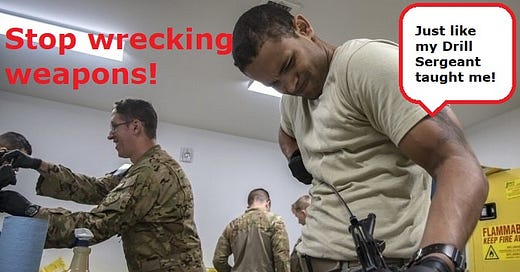My recommendation for cleaning firearms is don’t. Overzealous cleaning causes more harm than good and you’re better off with a dirty firearm rather than a damaged one.
Note that I did not say to avoid maintenance; I said to avoid cleaning. Fouling and carbon must be kept at bay and adequate lubrication is a must, however, frequent white-glove cleaning of a firearm is tantamount to abuse.
I like good old-fashioned Hoppe's No. 9 for the majority of gun maintenance chores. Any comparable and mild solvent is just as good. This helps dissolve fouling with the critical virtue of not instantly dissolving anything not made out of metal. It also has rust-preventative qualities, making it ideal to use on a single patch up the bore prior to storage. It does as good a job of preserving the bore as some gun oils, and will continue to work on any residual fouling while the gun is in storage, making it easy to wipe off after a future shooting session. For military issue weapons, I just stuck with CLP as it was always available.
Hoppe's Benchrest seems to be nothing more than standard No. 9 with some extra ammonia. This helps with copper fouling but should only be used if that is necessary.
Shooter's Choice is one of the best all-around solvents for centerfire rifles firing jacketed bullets. It dissolves most powder fouling quickly and does a good job on copper.
A good basic cleaning procedure is a patch or two down the bore wet with Hoppe’s, Shooter's Choice, or similar. Follow with a bore brush saturated in the same solvent if the bore needs extra scrubbing (it probably doesn’t.) Nylon is less abrasive but copper is just fine. Much more important than the type of brush, make certain the cleaning rod stays in line with the bore. If you can’t (or won’t) use a proper bore guide, use a pull-through cleaner.
Leave the solvent in the bore for several minutes to work, then push a few dry patches through to pick up the bulk of the residue. The patches don’t have to be perfectly clean. Unless you’re using corrosive primers - which is only a potential issue if you’re using very old (pre-World War 2) ammunition - no harm will be caused with a bit of remaining fouling. Even if you did clean “perfectly” you’d re-foul the barrel on the very first shot fired after cleaning anyway.
Sweet's 7.62 and similar are copper dissolvers full of ammonia; they should be used sparingly, if at all. If you’ve seen a notable decline in accuracy in a precision firearm (which requires you to be actively tracking/documenting such things and be a good enough shooter to notice) and you’re convinced it’s due to copper fouling, this is much cheaper than replacing the barrel. Of course, don’t use it with a bronze brush as it’ll dissolve that as well; use patches as it works on chemical reactions, not by scrubbing. Chase this with some wet patches soaked in water to flush out the ammonia and then a light gun oil, such as Rem Oil.
J-B Bore Cleaner is a mild paste abrasive. Put it in the same category as ammonia cleaners; use it only if you’re certain it might help after milder (and preferred) solvents aren’t cutting it. This is the only product used with a patch where the patch should be pushed back and forth through the bore several times, rather than pushed through once and allowed to drop off.
Do not mix solvents as that can damage metal from corrosion and pitting. If switching is desired (ammonia and then a mild solvent) push a couple of literally wet (with water) patches through, followed by a patch saturated with Rem Oil, then a degreaser through the bore to clear out the oil.
It is possible to get too carried away with gun cleaning. Some people act as if the merest trace of copper or powder residue in their barrels is a sign of severe moral turpitude, but that's not a realistic attitude. It's important to remember that barrel fouling is deposited in conditions of unthinkable heat and pressure, and it's probably impossible to remove every last molecule of dirt and metal, no matter what you do. Even if you did succeed, the very first shot you fired would undo most of your work.
Working guns are dirty. Maintained and lubricated, but still dirty. Cleaning tends to be inversely proportional to shooter skill; less skilled and less frequent shooters seem much more concerned about it. Barrels often require a certain minimum amount of fouling before they will shoot their best. Most of the time, strive to clean out enough crud to preserve accuracy and lubricate just enough for proper function without worrying about restoring a “perfect” bore or being totally clean. You’ll waste less time and cause less damage.





Notes on black powder shooting. The bores get nasty/sticky/dirty quickly. When in the field:
Put a mild charge down the barrel.
Follow with a standard paper wad.
Follow with a heavily oiled/greased patch.
Run a wet patch on a worm up-and-down the barrel a few times.
The combination of patches will wipe out most of the crud. You will be amazed at the filth that you have removed.
I am going to try Ballistol; endorsements from Othias and B.B. Pellitier are good enough for me!